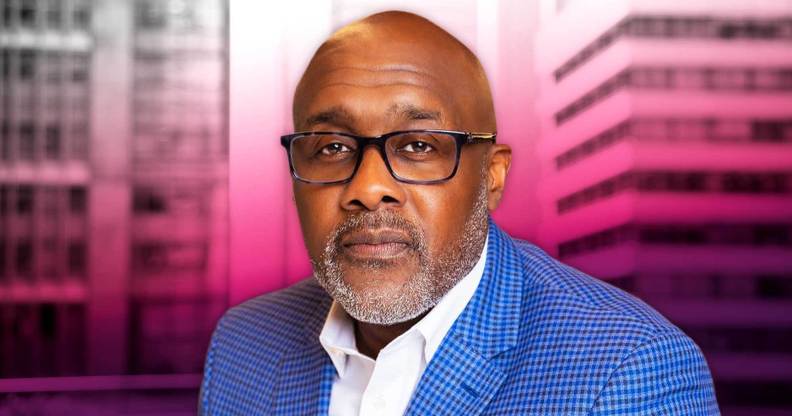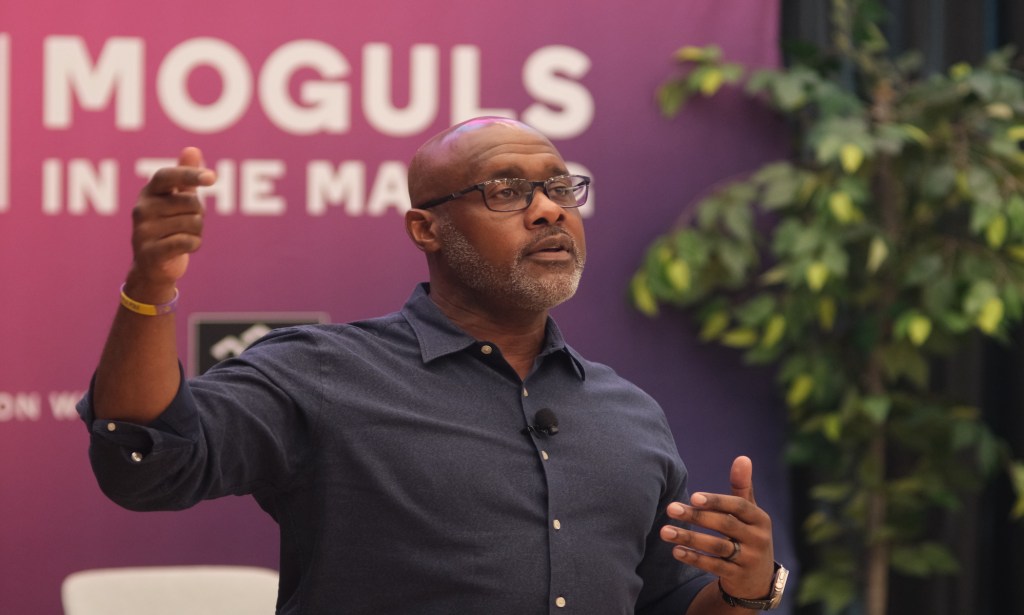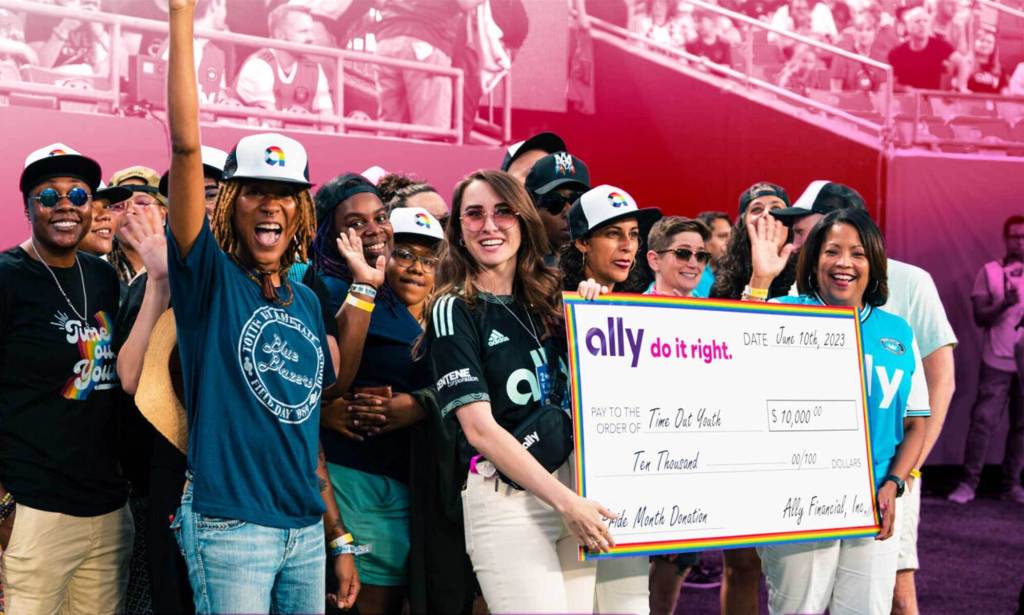‘We started with a blank page’: Ally Financial diversity chief on inclusion for 11,000 employees

Reggie Willis has been the chief diversity officer at Ally Financial since 2016. (Supplied/PinkNews)
For Reggie Willis, chief diversity officer at the digital financial company Ally, the pathway to a diverse, equitable and inclusive working environment involves transparency and accountability.
“People have always been my passion,” Willis tells PinkNews as he reflects on his career transition from financial risk management to DE&I. “I’ve always had an opportunity to incorporate that human-first thought process.”
Willis spent the first two decades of his professional career primarily in risk management at various financial institutions, which led him to take on a director role at Ally. As he entered his 40s, Willis says he began to contemplate his professional direction: “Is what I’m doing aligned with my purpose?”
Eventually, Willis came to the realisation that he had to “find a different way to connect what I felt was my purpose to my vocation.”
It was after a company town hall in 2015 – with Ally’s new chief executive officer in place and diversity and inclusion experts evaluating processes and priorities – that Willis was inspired to shift his career focus to DE&I. By 2016, he was given the opportunity to lead all DE&I work at the company.
“We started out with a blank page,” Willis remembers, “and I was smart enough to know that I didn’t know what I didn’t know.”
What followed was a year-long campaign of listening, holding focus group sessions and consulting with senior management and Board members to build a strong foundation for Ally’s approach to DE&I.

For Willis, the fundamentals of good policy start with respect: “Respecting the differing views, the different perspectives, the different experiences of your employee base.”
He explains that once that respect is established, the understanding of how those differences influence the culture and experience for different groups within the organisation flows naturally.
“You’ve got to get to the root and the systems that have enabled some of the disparate impacts to the populations that we’re dealing with,” he explains. “So how do you start to think systematically about ways that you are creating inclusion, ways you are creating equity and ways that you are actively engaging in creating diverse environments?”
Willis thinks the approach must be two-fold – one part dealing with the systems, and the other dealing with the environment and the behaviours within it.
“When you bring those two things together, you create opportunities for people to feel that connection, that purpose, that sense of belonging and welcoming.”
‘We’ve got to be able to have sat in their shoes’
Willis believes the key to maintaining an inclusive workplace is transparency and accountability. In the spirit of that transparency, Ally is open about its DE&I programme, with a public timeline of initiatives as well as a demographic data breakdown of women and other marginalised groups and their roles within the boardroom and senior leadership, as well as retention rates.
“When I was in my 20s, I didn’t have an opportunity to see a lot of people that look like me in senior roles,” Willis reflects, “so I think it’s critical for young talent to be able to see something because if you can see it, you can be it.”
He adds: “The ability for you to see yourself in leadership allows people to believe that there are possibilities and a future for them within the organisation.”
Willis also believes that diverse leadership leads to diversity of thought, from both a theoretical perspective and from lived experiences. Those experiences create “opportunities for innovation that create opportunities for transcending the space that we’re in today.”
He also notes that diverse leadership is vital in order to serve a diverse population of customers.
“We’ve got to be able to have sat in their shoes or to have lived similar experiences to be able to connect.”
‘We’re going to miss out on opportunities’
When Willis took on the role of leading DE&I at Ally, one of the fundamental first steps was creating employee resource groups (ERGs). Ally has a total of 8 ERGs – which range from Black and Hispanic groups to LGBTQ+, Veterans and a generational group – and all play a pivotal part in shaping the company’s DE&I policies, employee benefits and how the company interacts within the wider community.
“If we’re not cognizant of the needs of each of those demographics, we’re going to miss out on opportunities,” he says.
The company’s LGBTQ+ employee group, Pride ALLYS, has been instrumental in expanding the company’s family leave benefits and eliminating an infertility diagnosis to participate in IVF benefits, thus giving single people and same-sex couples the same opportunity and financial resources to start a family as heterosexual couples.

Willis also highlights the group’s work in creating a “greater sense of awareness” towards the anti-LGBTQ+ laws that are “attacking the very existence of the community.”
He says that understanding can create a better sense of allyship: “That’s one of the big things that we’ve been working on is the understanding of allyship – how to be an advocate for someone else to something even as simple as sharing pronouns.
“Although I’m cis-gendered, I do understand the need to share my pronouns. So people who may not be cisgender, those who are non-binary or gender fluid, have the opportunity to express themselves in a way that creates comfort and psychological safety.”
Willis says that the Pride ALLYS group is vital in being able to offer that same experience to their customer base.
“Now, our customers have the option to use their preferred pronouns in their account information, so when they do speak to one of our reps, they’re going to get the experience they’re looking for.”
It’s in the name
The theme of allyship is woven throughout all of Ally’s DE&I practice areas. The company’s allyship with the LGBTQ+ community also holds a special – and very personal – place in Willis’ heart.
“Both my children are queer and identify in the LGBTQ community,” he proudly states. “So early on in the work, I wanted to make sure that if they were to step into the four walls of Ally, would they feel comfortable. Would they feel like this was a place that they would be accepted, that they would be able to thrive and grow?”
Aside from the psychological safety that comes with sharing pronouns, Ally’s commitment to LGBTQ+ inclusion is to make sure the community has the same opportunities to progress and flourish as other groups.
“How are we creating opportunities for them?” Willis asks rhetorically.
“We know that for a long time, [the LGBTQ+ community] have been historically excluded,” he continues.
“So you have to be intentional about including those populations. And for us, that’s why we want to make sure we have an awareness of who falls in that group so we can make sure we’re taking the appropriate steps to create an equitable environment.”
“Listen more than you speak”
As for the advice Willis would give to other DE&I professionals looking to evolve their practice, he says it’s about two things: assessing and listening.
By taking an honest assessment of where the company currently sits in the DE&I curve, Willis believes that business leaders will come to recognise the work that still needs to be done.
“I think too many times people portray themselves where they want to be, versus where they are now, and don’t realise that closing that delta is really difficult.”
As for listening, it’s quite simple: “Listen more than you speak, and go out and try to get as many viewpoints as you can.”
Above all else, Willis says the purpose of a DE&I practitioner isn’t to wag fingers and tell them what they’re doing is wrong, but rather “meet them where they are and let them experience the journey with you.”
“You’re always going to be a step ahead of the organisation,” he concludes.
“Your job is to illuminate the path for them.”

